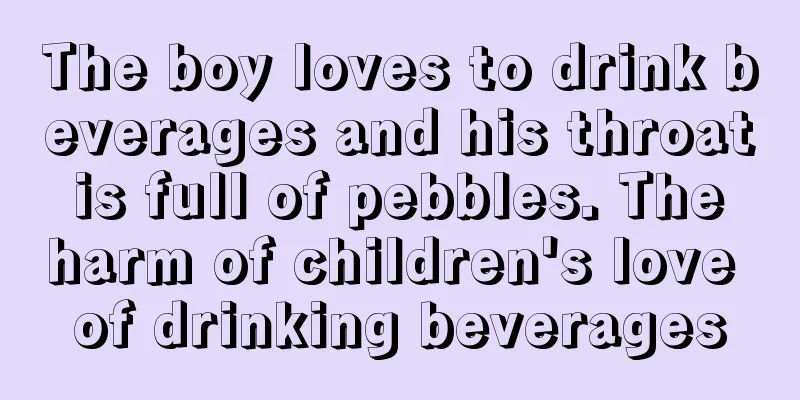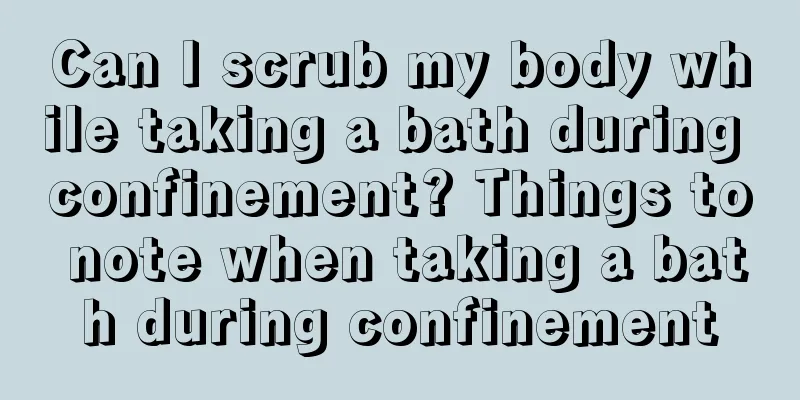Can a newborn baby take a bath if his belly button hasn't fallen off? Pay attention to applying a waterproof patch

|
Caring for a newborn requires extra care, so, can a newborn be bathed if the belly button has not fallen off? Can a newborn baby be bathed if his belly button has not fallen off?A newborn baby can be bathed if his belly button has not fallen off. However, you can put on a waterproof sticker before bathing, peel off the waterproof sticker after bathing, and use a disposable liquid wiper containing iodine to clean the baby's umbilical cord to avoid water stains in the umbilical cord. Another method is that if there is no waterproof sticker, wash the upper body first and then the lower body when bathing the baby, and try not to let the umbilical cord get wet. How to tell if a newborn's belly button is good?After the umbilical cord falls off, the navel is dry and has no exudation, no signs of redness or infection, the navel does not bulge, and the baby's navel does not smell bad. If the baby's navel is like this, then it means that the baby's navel has grown well. Note: If the baby has secretions in the umbilical cord, it is best for the mother to wipe the baby with alcohol once or twice a day. After two or three days, it will get better. A dry umbilical cord can accelerate the healing of the navel. If the exudate is yellow mucus with a foul odor, it means that the umbilical cord is infected and needs to be treated promptly. Nursing principlesThe wound of the cut umbilical cord is a big wound for the newborn baby, so mothers should be very careful when caring for it. The following principles should be followed in caring for the umbilical cord of newborn babies: 1. Keep dry. Like most traumatic wounds, the remaining umbilical cord of a newborn should be kept dry. A moist environment with water is a breeding ground for bacteria, and the proliferation of bacteria will increase the chance of wound infection. Therefore, the umbilical cord of a newborn must not be exposed to water. If it is slightly exposed to water, it must be handled in time and kept dry. 2. Keep breathable. The cells near the wound also need to breathe, and keeping it breathable can help the wound recover faster and better. At the same time, a breathable environment is not conducive to the growth of anaerobic bacteria, so the wound is naturally less susceptible to infection. 3. Avoid friction. The skin of a newborn baby is very tender, especially the wound part. If the remaining part of the umbilical cord is often rubbed, it is likely to become red, inflamed or bleed, which is not conducive to the recovery of the wound. 4. Clean every day. A small amount of secretion will appear in the umbilical fossa of a newborn from birth to the time when the umbilical cord falls off. If it is not cleaned every day, it is difficult to keep the wound dry and breathable. After the secretion dries, adhesion will occur in the umbilical fossa, so it is necessary to ensure that the umbilical fossa is cleaned every day. How long does it take for the umbilical cord of a newborn to fall off?The umbilical cord is the channel that connects the baby to the mother (placenta) in the mother's belly. The nutrients needed by the fetus during the period of pregnancy are obtained through the umbilical cord. Generally speaking, the umbilical cord will naturally dry up within 24-48 hours after the baby is born, and will start to fall off after 3-4 days, and will heal on its own in 10 days to half a month. After the umbilical cord falls off normally, the mother can apply some gentian violet to disinfect the baby's navel. As for the scab after the umbilical cord falls off, you should patiently wait for it to fall off on its own, and do not dig it out artificially. If the umbilical cord of some babies has not fallen off after 2 weeks, parents will start to worry. If the umbilical cord has not fallen off after a certain period of time, parents should not panic. Let us first observe the baby's navel to see if there are any signs of moisture, redness, swelling, exudation or pus. If not, you may wish to observe it for a few more days and wait for the umbilical cord to fall off naturally. If the above adverse symptoms occur, you should go to the hospital in time and cooperate with the doctor's diagnosis and treatment. |
<<: Can you touch a newborn's head? It is not recommended.
>>: What is the matter with the black hair on the newborn's ears? Pay attention to two situations
Recommend
How to deal with children's rebellious period
It is normal for children to have a rebellious pe...
What to do if you have breast milk diarrhea? Prevention of breast milk diarrhea
It is often said that babies who are breastfed fr...
Are the plugs for electric mosquito repellent liquid universal? Can different mosquito repellent liquids use the same plug?
Electric mosquito repellent liquid is a mosquito ...
Does it hurt to have a hydrotubation? Does it hurt to have a hydrotubation?
Tubal infertility is a common infertility problem...
What are the symptoms of iodine deficiency in babies? What foods are good for babies to eat to supplement iodine?
Iodine is very important to the human body. If it...
Can I eat crabs during pregnancy preparation? Is it good to eat crabs during pregnancy preparation?
During the period of preparing for pregnancy, wom...
How to judge whether you can have a natural birth based on the three criteria
Generally speaking, a natural birth is better tha...
Will taking folic acid affect ovulation? Will taking folic acid affect ovulation?
Girls are always very sensitive when preparing fo...
How long will the menstruation be delayed after taking the birth control pill? How long will it take for the menstruation to come after taking the birth control pill?
Although birth control pills are a convenient, fa...
What country is the brand of AMUSE dolls? Tokyo otaku cultural goods
AMUSE dolls are so cute and adorable. Where do th...
What are the signs of impending delivery? Pay attention to these signs
The first signal is spotting. Bleeding is the mos...
How to train your baby to eat by himself blw independent eating method
When babies enter the stage of eating complementa...
When can babies eat oil? Can babies eat oil?
Can babies eat oil? Oil is a traditional essentia...
What should I do if my child has a fever of 39 degrees? Can I use physical methods to reduce the temperature of my child?
Children often have fever and colds in their earl...
Does a child with ADHD need treatment? What should I do if my child has ADHD?
Usually most children are prone to ADHD, and some...









